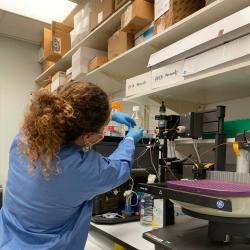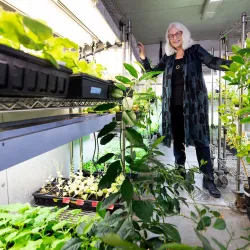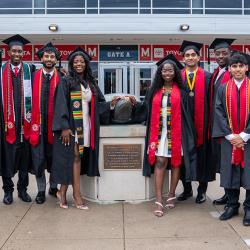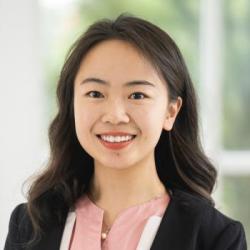Todd Cooke Honored with 2020 Kirwan Undergraduate Education Award
In his 42 years at the University of Maryland, Cell Biology and Molecular Genetics Professor Todd Cooke has always had a passion for teaching. And he made it a personal mission to create opportunities for students to succeed.
“For me, teaching is a commitment to engage in the exhilarating experience of learning from each other to make the world a better place,” Cooke explained. “I talk to students about what their aspirations are and what their motivations are—and I can translate those feelings into academic experiences.”
Of all his academic contributions, there’s one he’s most proud of. Cooke founded and then directed the Integrated Life Sciences (ILS) program in the Honors College since 2011. This unique program for first- and second-year students combines an accelerated biological sciences curriculum with research and community service—all in a living-learning environment that promotes collaboration and community. Over 650 students have participated in the program since it began. With Cooke as the program’s inaugural director, ILS built an extraordinary track record of achievement, one student at a time.
“ILS students win a disproportionate number of national and international scholarships, including Rhodes and comparable awards, they get accepted to med and grad schools at percentages often over 90%, so they’re very successful academically,” Cooke explained. “But the real success of the program to me is measured in the quality that ILS students have become as people, that they’re going to work to make this a more just, equitable and healthier world.”
Well-liked by his students, Cooke earned the nickname of “grandfather” of the ILS program. For many, like 2017 Marshall Scholar Aaron Solomon (B.S. ’17, biological sciences), Cooke has been a source of support and inspiration.
“Dr. Cooke has been a tireless champion for his students, both in their professional lives and their personal development,” Solomon said. “He has believed in us in times we did not believe in ourselves, encouraged us to pursue our passions, and provided advice and undivided attention.”
In June, as Cooke stepped down as ILS director, he was selected to receive the university’s 2020 Kirwan Undergraduate Education Award, which honors a faculty member who has made exceptional contributions to the quality of undergraduate education at UMD.
“It’s a big-time surprise. It’s an incredible capstone to my professional career, and I’m so grateful. But I really want to make it clear that such teaching awards are not given to faculty members working in isolation,” Cooke observed. “Instead this Kirwan Award is also recognizing the deep commitments that my department and college have made to high-quality undergraduate education for the last 40 years. These commitments have greatly contributed to the success of my teaching efforts.”
For Cooke, it was a long road to get here. Growing up in a small rural community in western New York, just getting a college education was no small feat.
“I’m just a small-town kid who got lucky,” Cooke explained. “Very few of my high school classmates went to college. Some of those came home for the first day of deer hunting season and never went back to school. That I was lucky enough to go to college and then graduate school was not expected from my background.”
And becoming a scientist? Definitely not part of the plan. Cooke started as a sociology and economics major, switched to history and literature, and finally settled on philosophy, until a single conversation changed everything.
“At the end of my junior year, my philosophy professor came to me and said 14 words that changed my life: ‘Todd, you are a nice boy but you’re no philosopher. Please try something else,’” Cooke recalled, laughing. “So, all I had left was science.”
Senior-year science courses led Cooke to a National Science Foundation graduate fellowship and eventually a Ph.D. from Cornell. At UMD, he was hired for his research in plant development and evolution and has taught more than 15 different courses over the years. Collaborating with his colleagues, Cooke was instrumental in modernizing the botany/plant biology curriculum and his innovations brought a new, multidisciplinary perspectives to life sciences education.
His style as a professor is hands-on and interactive, holding office hours in the Diner and looking for ways to keep students engaged.
“The idea is that I can learn from the students and it’s an absolutely exhilarating experience that’s hardwired in my teaching,” Cooke said.
So is spontaneity.
“The moment I prize the most is when I was in a class presenting an active-engagement activity about how diffusion works in biology and a student raised his hand and said, ‘Dr. Cooke, you could do better.’ And I thought for a moment and said, ‘OK, let’s do it your way’ and we stopped the class and we did it his way,” Cooke said. “Guess what. It was better. It was much better.”
A key focus for Cooke has always been to improve the overall learning experience. For one group of high-achieving students that became especially important.
“A significant number of honors students in the life sciences were coming in as freshmen having tested out of their freshman-level science and math classes, and instead of engaging them at the level they were coming in at, they were told to take general education classes,” Cooke explained. “So, there was clearly a demand for a program that would meet the students where they were.”
Gradually, ILS—a program designed to challenge these students with courses appropriate for their background—went from idea to reality.
“I got a call from Bob Infantino, the college’s associate dean for undergraduate education, and I think it was December of 2010,” Cooke recalled. “He said, ‘Did you see The Diamondback? The provost approved the ILS program. He didn’t appoint a director and I’ve already got a job, so you’re probably going to direct it.’ We started recruiting the first class of students in the next month, and they started in fall of 2011.”
Now, after nearly a decade, Cooke is ready for new challenges, looking forward to having more time for research, family and yes, even ILS.
“I am thrilled about the opportunities ahead,” Cooke said. “I don’t see this as retirement because I am going to do research on some weird plants who are apparently disobeying the basic rules thought to govern plant development and evolution, and I am still going to be involved in the ILS program.”
Cooke’s next goal for ILS is to create an alumni network, where current and former students can share their experiences, dreams and continuing commitments to giving back to their communities, honoring the values Cooke instilled with participants from the day ILS began. As a teacher, he couldn’t ask for more.
“As teachers we’re in the business of sharing the knowledge and wisdom of our discipline, whatever our discipline is. But it’s really hard to measure what impact that has,” Cooke said. “I think what ILS does is that it enhances the abilities of its students to live meaningful and impactful lives, which I find deeply rewarding.”
###
Media Relations Contact: Leslie Miller, 301-405-9267, lmille12@umd.edu
University of Maryland
College of Computer, Mathematical, and Natural Sciences
2300 Symons Hall
College Park, Md. 20742
www.cmns.umd.edu
@UMDscience
About the College of Computer, Mathematical, and Natural Sciences
The College of Computer, Mathematical, and Natural Sciences at the University of Maryland educates more than 9,000 future scientific leaders in its undergraduate and graduate programs each year. The college's 10 departments and more than a dozen interdisciplinary research centers foster scientific discovery with annual sponsored research funding exceeding $200 million.








